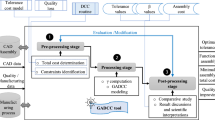Abstract
Since no mechanical part can be manufactured with exact dimensions and perfect shape, tolerances, together with dimensions, are used to specify acceptable variations of part geometry. To ensure design functionality, assemblability and manufacturability, tolerances must be specified and checked. Currently, dimensions and tolerances are usually placed on design drawings of CAD systems in accordance with ANSI [1], ISO [2] or other national standards. Tolerance analysis is used to check the stack-up of related tolerances. The process of tolerance accumulation is modelled, and the accumulated tolerance is verified. Tolerance synthesis (or tolerance design), on the other hand, is the process of allocating tolerance values derived from design requirements in terms of functionality or assemblability among related design tolerances. It is a process of distributing a few known tolerance values.
Access this chapter
Tax calculation will be finalised at checkout
Purchases are for personal use only
Preview
Unable to display preview. Download preview PDF.
Similar content being viewed by others
References
American National Standard Institute. Dimensioning and tolerancing. ANSI Y14.5M, The American Society of Mechanical Engineers, New York, 1982
ISO-129 Dimensioning, ISO-1101 Geometrical tolerancing
Wade OR. Tolerance control in design and manufacturing. Industrial Press, New York, 1967
Bjorke O. Computer-aided tolerance. Tapir Publishers, 1978
Hillyard RC and Braid IC. Analysis of dimensions and tolerances in computer-aided mechanical design. Comput-Aided Des 1978; 10: 161–166
Hoffmann P. Analysis of tolerance and process inaccuracies in discrete part manufacturing. Comput-Aided Des 1982; 14: 83–88
Parkinson DB. Tolerancing of component dimensions in CAD. Comput-Aided Des 1984; 16: 25–32
Dong Z, Soom A. Automatic tolerance analysis from a CAD database. Paper presented at the 12th design automation conference in Columbus, Ohio, 1986, ASME 86-DET-36
Turner JU, Wozny MJ. A mathematical theory of tolerances. In: Wozny M, McLaughlin H, Encarnacao J, (eds) Proceedings IFIP G 5.2 working conference on geometric modelling for CAD applications, North-Holland, 1987
Greenwood WH, Chase KW. A new tolerance analysis method for designers and manufacturers, J Eng Indust 1987; May: 109–113
An introduction to VSA™ variation simulation analysis software. Applied Computer Solutions, Inc., Clair Shores, MI, 1987
Nilsson NJ. Principles of artificial intelligence. Springer-Verlag, 1982
Winston PH. Artificial intelligence. Addison-Wesley, 1984
Charniak E, McDermott D. Introduction to artificial intelligence. Addison-Wesley, 1985
Smith B, Wellington J. Initial graphics exchange specification (IGES). Version 3.0, NBSIR 86-3359, US Department of Commerce, April, 1986
Spotts MF. Allocation of tolerances to minimize cost of assembly. ASME J Eng Indust 1973; August: 762–764
Bandler J. Optimization of design tolerances using nonlinear programming. J Optim Theory Applic, 1974; 14: 99–114
Michael W, Siddall JN. The optimization problem with optimal tolerance assignment and full acceptances. ASME J Mech Des, 1981; 103: 842–848
Michael W, Siddall JN. The optimal tolerance assignment with less than full acceptances. ASME J Mech Des 1982; 104: 855–860
Parkinson DB. Assessment and optimization of dimensional tolerances. Comput-Aided Des 1985; 17: 191–199
Chase KW, Greenwood WH. Design issues in mechanical tolerance analysis. Manuf Rev 1988; 1: 50–59
Wu Z, Elmaraghy WH, Elmaraghy HA. Evaluation of cost-tolerance algorithms for design tolerance analysis and synthesis. Manuf Rev 1988; 1: 168–179
Speckhart FH. Calculation of tolerance based on a minimum cost approach. ASME J Eng Indust 1972; 94: 447–453
Forsyth R. Expert systems principles and case studies. Chapman and Hall, 1984
Waterman DA. A guide to expert systems. Addison-Wesley, 1986
Trucks HE. Designing for economical production. Smith HB (ed), Society of Manufacturing Engineers, Dearborn, MI, 1976
Editor information
Editors and Affiliations
Rights and permissions
Copyright information
© 1991 Springer-Verlag London Limited
About this chapter
Cite this chapter
Dong, Z., Soom, A. (1991). Some Applications of Artificial Intelligence Techniques to Automatic Tolerance Analysis and Synthesis. In: Pham, D.T. (eds) Artificial Intelligence in Design. Artificial Intelligence in Industry Series. Springer, Berlin, Heidelberg. https://doi.org/10.1007/978-3-642-74354-2_5
Download citation
DOI: https://doi.org/10.1007/978-3-642-74354-2_5
Publisher Name: Springer, Berlin, Heidelberg
Print ISBN: 978-3-642-74356-6
Online ISBN: 978-3-642-74354-2
eBook Packages: Springer Book Archive




